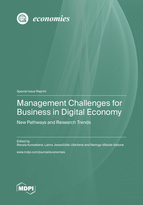Management Challenges for Business in Digital Economy: New Pathways and Research Trends
A special issue of Economies (ISSN 2227-7099).
Deadline for manuscript submissions: closed (31 December 2022) | Viewed by 49481
Special Issue Editors
Interests: internationalization and international entrepreneurship; entrepreneurship and human capital; entrepreneurship and social capital; regional development; strategic management; human resource management
Special Issues, Collections and Topics in MDPI journals
Interests: organization management and development; leadership and human resource management; management of social issues in organization and among consumers behaviour
Special Issue Information
Dear Colleagues,
The digital economy has significantly impacted countries throughout the world by contributing to the growth of the economy and the further progress of societies. Recent developments demonstrate that the information and innovation-driven era triggered integration of traditional activities and digital technologies. Moreover, the rise of innovation has been accelerating in emerging industries such as cleantech, the new generation of information technology, biotechnology, and high-end equipment manufacturing. The estimations provided by the World Economic Forum predict that “new value creation over the next decade will be based on digitally enabled platform business models” (www.weforum.org). Therefore, traditional organizations must change the approaches adopted and capture value in the context of digital disruptions. These tendencies raise a number of management challenges that need to be solved by the efforts of the scientific community. Therefore, this Special Issue provides the platform for a fruitful discussion and the development of relevant theories.
What novel techniques are leading to ground-breaking theories? To answer this question, researchers are encouraged to integrate new ideas from other disciplines. The extension of general systems theory in the field of organizations, aiming to transform prevailing approaches, is a classic example of such integration. Furthermore, researchers are encouraged to apply new methods, which would be helpful for theorizing. Management challenges appear at many different levels: micro, mezzo, and macro. Thus, we have to answer the following questions: What is the role of employees in the digital transformation of businesses? What are some fruitful ways to deal with the challenges of new methods, approaches to work, and attempts to maintain the high performance of organizations? How can we balance the needs of employees and the demands of owners and managers? How are the processes and capabilities of organizations changing and how do these changes influence performance? How do the dynamics of competition, networking, and pressure groups shape organizations and what managerial approaches are relevant in this context? How does consumer behaviour shape the market situation and challenges of an organization? How can we respond to the challenges of economic disruptions and technological and social changes? Thus, this Special Issue contributes to closing these gaps in the scientific literature. High-quality papers are warmly welcomed.
Dr. Renata Korsakienė
Dr. Laima Jesevičiūtė-Ufartienė
Dr. Neringa Vilkaitė-Vaitonė
Guest Editors
Manuscript Submission Information
Manuscripts should be submitted online at www.mdpi.com by registering and logging in to this website. Once you are registered, click here to go to the submission form. Manuscripts can be submitted until the deadline. All submissions that pass pre-check are peer-reviewed. Accepted papers will be published continuously in the journal (as soon as accepted) and will be listed together on the special issue website. Research articles, review articles as well as short communications are invited. For planned papers, a title and short abstract (about 100 words) can be sent to the Editorial Office for announcement on this website.
Submitted manuscripts should not have been published previously, nor be under consideration for publication elsewhere (except conference proceedings papers). All manuscripts are thoroughly refereed through a single-blind peer-review process. A guide for authors and other relevant information for submission of manuscripts is available on the Instructions for Authors page. Economies is an international peer-reviewed open access monthly journal published by MDPI.
Please visit the Instructions for Authors page before submitting a manuscript. The Article Processing Charge (APC) for publication in this open access journal is 1800 CHF (Swiss Francs). Submitted papers should be well formatted and use good English. Authors may use MDPI's English editing service prior to publication or during author revisions.
Keywords
- organization and management
- strategic management
- innovation management
- organizational restructuring
- strategy
- stakeholders
- business models
- international management
- marketing
- digital marketing
- consumer behaviour
- leadership
- human resource management
- digital recruitment
- engagement of employees
- artificial intelligence in an organization
- risk management
- research methods
- comparative analysis
- bibliometric analysis
- systematic literature review






